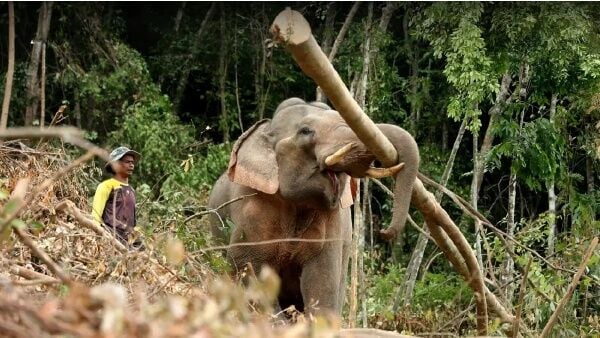The dark secrets of Thailand’s elephant tourism industry

In a recent interview, concerns about the welfare of domesticated elephants have surged. These gentle giants, pivotal to Thailand’s economy since ancient times, now face a crisis that threatens their very existence.
During the Rattanakosin era, domesticated elephants bolstered Thailand’s economy by logging. However, a tragic turn in 1988, when floods and landslides claimed lives, forced a shift. Former Agriculture Minister Sanan Kachornprasart’s swift action suspended logging, leaving elephants and their mahouts jobless.
In the wake of the Covid-19 pandemic, as tourism plummeted, elephants suffered again. With parks shuttered, many mahouts returned home, while some turned to online shows to survive.
But beneath the surface of this lucrative industry lies a darker reality. Mahouts, wielding hooks and chains, raise concerns about animal welfare. Founder of the Save Elephant Foundation, Saengduean Chailert, exposes the separation of baby elephants from their mothers, risking their health and happiness, reported The Nation.
As cries for justice echo, experts demand accountability. Chief vet Taweepoke Angkawanish urges comprehensive care standards. He asserts that proper training, not abuse, is key to preserving these majestic creatures.
In related news, as Thailand marks the country’s National Elephant Day, authorities are rolling out ambitious plans to safeguard the majestic creatures and mitigate human-elephant conflicts. With a blend of innovation, community involvement, and legislative actions, the nation aims to secure the future of both wild and domesticated elephants.
In other news, Thailand stands accused of a sinister practice: the captive breeding of elephants for its lucrative tourism industry. But the horrors extend far beyond just elephants. Researchers have uncovered alarming findings, exposing the grim reality lurking behind the scenes of the wildlife entertainment industry.
In a study conducted by World Animal Protection (WAP), the scope of the issue is laid bare. An estimated 5.5 billion wild animals, spanning 487 species, endure cruel captivity worldwide, with elephants, bears, and lions among the most exploited.
Latest Thailand News
Follow The Thaiger on Google News:


























